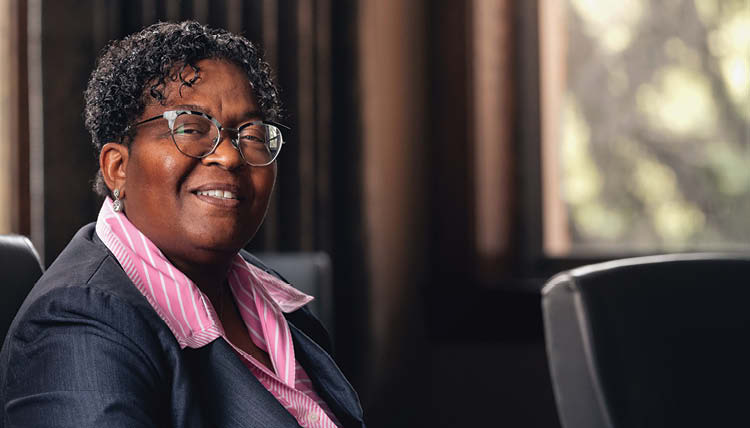Mastering Higher Education: Charlita Shelton

Of the many presentations Charlita Shelton has delivered online, around the nation, and across the pond to audiences of higher education professionals, this one stands out: “From the Ghetto to the Presidency, An Intersectionality Journey through Time.” It seems a befitting title for her biography, too.
Shelton, 63, was born on Chicago’s South Side, where the development of “the projects” fostered the poverty and crime for which the neighborhood became notorious. In 1965, her father had a presage and moved the family of eight to Michigan where they lived in a single-wide trailer on 40 acres of farmland.
A Marine Corps veteran, Shelton holds two master’s degrees and a Ph.D. – a mixture of communications, human development and educational administration that makes her a highly sought-after consultant and leader. She has served as president of two graduate universities, specialized in academic compliance and strategic planning, conducted research on the retention of students of color, and devoted herself to the ever-changing, constantly growing field of diversity work at institutions of higher education.
Shelton arrived at Gonzaga in 2019 as the interim assistant chief diversity officer, and when COVID-19 required campus-wide organizational shifts, President Thayne McCulloh asked her to lead that effort. Still a contract employee, Shelton is now the president’s chief of staff and is eager to get to work on the next long-range planning efforts.

MAKING ADJUSTMENTS
When the executive placement firm first contacted Shelton about possibilities at Gonzaga, she wasn’t sure GU or Spokane would be a great fit. Having lived in major metropolitan cities such as D.C., Detroit, Dallas and Atlanta, she enjoys being surrounded by different cultures, which oftentimes produce a different way of thinking and inclusive perspectives,” Shelton says. She also had never served at a Catholic institution or had experience with the Jesuit order. Then she met with several academic leaders and was hooked. While the ethnic diversity of Gonzaga’s faculty and staff, and student body, are not remarkable, the Provost Council is the most inclusive Shelton has seen anywhere. With deans who are Latina and Asian, a provost who is Native New Mexican, and the sum of the council being more women than men – it’s a dream team.
“All I could think was, ‘Wow, this is going to be a great opportunity,’ ” Shelton says. “Here is a predominantly white institution trying to do what is right for historically underrepresented people.”
The key word for accepting a role at Gonzaga was "opportunity” – namely, opportunity to help spread the diversity of the Provost Council throughout the whole faculty, staff and student body. The fall 2021 incoming class is the most diverse ever, with 30% of students identifying as other than white, but only 15% of professors (excluding adjuncts) are people of color.
Fortunately, says Shelton, “I feel really good about the courageous nature of Zags in terms of adding challenges. I’m encouraged by work taking place across campus.”
After 32 years in higher education, I have found the most kind, considerate people to work with at Gonzaga. Good people who really care about the institution and the students they serve. That’s refreshing.
GETTING TO KNOW CHARLITA
Reading recommendations: “Seven Spiritual Laws of Success” by Deepak Chopra and “Return to Love” by Maryann Williamson
Ideal vacation: Tahiti, Las Vegas, Lake Tahoe; or San Diego, Denver and Phoenix for visiting friends.
Beverage of choice: White wines, preferably aged in steel rather than oak.
LOOKING AHEAD
Eight short months after finishing her Ph.D., Shelton took her first position as a college president. A professional school of psychology, it had barely 200 students. Within five years, that grew to 2,000.
Between presidential roles and a variety of experiences through consulting, Shelton is well-positioned to assist President McCulloh in changing leadership structures. The former Cabinet – a longstanding exclusive structure used at many institutions – has been replaced by a more fluid Executive Leadership Team, which includes a broader range of midlevel leaders.
“It’s the result of a comprehensive leadership evaluation, and allows for more operational and tactical work,” Shelton says. She believes that will help speed the process of making decisions and implementing changes, which has been a challenge.
“These next few years are going to be formative,” she says. “We’re striving to become more efficient, which will make us more effective.” Beyond that, retirement is looming, and while Shelton says she’ll never fully retire, she would welcome the chance to teach at the graduate level and mentor doctoral students in the School of Leadership Studies.
Without a doubt, students would be lucky to learn from her.
